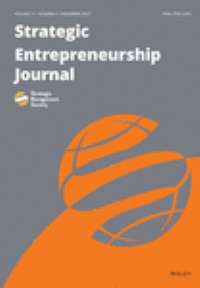Rethinking the rollercoaster: Resilience and affect in entrepreneurship
IF 6.3
2区 管理学
Q1 BUSINESS
引用次数: 0
Abstract
Research SummaryThe emotional rollercoaster of entrepreneurship is characterized by encounters with challenges that impede venture progress. Consequently, resilience, which is reflected in the ability to maintain functioning through such challenges, has become of particular interest to scholars. Existing research emphasizes the ability of resilient individuals to use positive emotions to overcome challenges. Yet, scholarship has largely overlooked the role of affective fluctuations in resilience processes, which is problematic for entrepreneurs facing the chahighs and lows of venturing. This daily diary study of technology entrepreneurs reveals that those who are more resilient report smaller day‐to‐day fluctuations in their affective state over the course of two working weeks. This finding suggests that theory on self‐regulation may serve as an important key in understanding the microprocesses underlying resilience.Managerial SummaryEntrepreneurship is often considered an emotional rollercoaster. For this reason, many entrepreneurs are interested in understanding resilience and its role in managing the ups and downs of business venturing. This research examines the relationship between resilience and fluctuations in affect by studying entrepreneurs over the course of two working weeks, as they confront a challenge in their venture. The results show that entrepreneurs who are more resilient also report smaller changes in affect day‐to‐day. This suggests that entrepreneurs looking to enact resilience may need to turn the emotional rollercoaster of entrepreneurship into a train ride.重新思考过山车:创业中的韧性和影响
创业的情绪过山车的特点是遇到阻碍创业进展的挑战。因此,反映在通过这些挑战保持功能的能力上的弹性已成为学者们特别感兴趣的问题。现有的研究强调了弹性个体利用积极情绪克服挑战的能力。然而,学术界在很大程度上忽视了情感波动在韧性过程中的作用,这对于面临风险的企业家来说是一个问题。这项对科技企业家的每日日记研究表明,在两个工作周的过程中,那些更有弹性的人的情绪状态每天的波动较小。这一发现表明,自我调节理论可能是理解心理弹性背后的微过程的重要关键。创业通常被认为是情绪过山车。出于这个原因,许多企业家对理解弹性及其在管理商业冒险的起起落落中的作用感兴趣。这项研究通过对企业家进行为期两个工作周的研究,考察了他们在创业中面临挑战时的适应力和情绪波动之间的关系。结果显示,弹性更强的企业家每天的情绪变化也更小。这表明,想要展现韧性的企业家可能需要把创业的情绪过山车变成一趟火车之旅。
本文章由计算机程序翻译,如有差异,请以英文原文为准。
求助全文
约1分钟内获得全文
求助全文
来源期刊

Strategic Entrepreneurship Journal
Multiple-
CiteScore
11.10
自引率
1.60%
发文量
31
期刊介绍:
The Strategic Entrepreneurship Journal is a research journal that publishes original work recommended by a developmental, double-blind review process conducted by peer scholars. Strategic entrepreneurship involves innovation and subsequent changes which add value to society and which change societal life in ways which have significant, sustainable, and durable consequences. The SEJ is international in scope and acknowledges theory- and evidence-based research conducted and/or applied in all regions of the world. It is devoted to content and quality standards based on scientific method, relevant theory, tested or testable propositions, and appropriate data and evidence, all replicable by others, and all representing original contributions. The SEJ values contributions which lead to improved practice of managing organizations as they deal with the entrepreneurial process involving imagination, insight, invention, and innovation and the inevitable changes and transformations that result and benefit society.
 求助内容:
求助内容: 应助结果提醒方式:
应助结果提醒方式:


